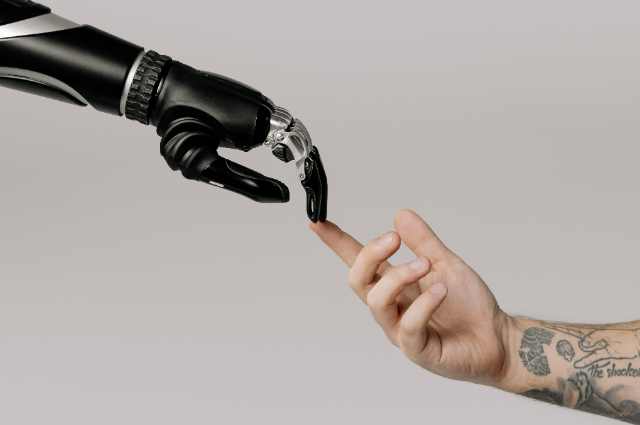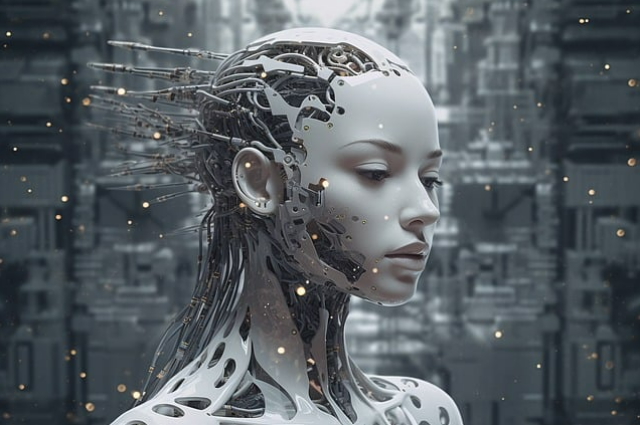
Introduction
The advent of artificial intelligence (A.I.) has sparked intense debates about the future of humanity and its relationship with technology. While some envision a utopian coexistence where A.I. enhances human capabilities and frees us from menial tasks, others fear a dystopian future where machines outpace human intelligence and autonomy. As A.I. continues to advance at an unprecedented rate, it is essential to explore the dynamics between humans and A.I., understanding both the challenges and the opportunities that lie ahead. This article delves into the multifaceted aspects of the Human vs. A.I. debate, exploring how embracing the synergy of man and machine can lead to a brighter and more promising future.
1. A.I. and Human Intelligence: Complementing Strengths
Artificial intelligence, at its core, is a simulation of human intelligence carried out by machines. However, it is crucial to recognize that A.I. and human intelligence possess different strengths and weaknesses. A.I. excels at processing vast amounts of data, recognizing patterns, and performing repetitive tasks with unwavering precision. In contrast, humans possess creativity, emotional intelligence, critical thinking, and a moral compass that A.I. lacks.
By understanding these unique qualities, we can envision a future where A.I. augments human abilities rather than replaces them. For instance, in healthcare, A.I. can analyze medical data and assist in diagnosis, allowing medical professionals to focus on personalized patient care and empathy. In the workplace, A.I. can handle repetitive tasks, leaving humans with more time for innovative thinking and problem-solving. Embracing the synergy of man and machine can lead to a more efficient and productive society.
2. The Threat of Job Displacement
One of the most significant concerns regarding A.I. is its potential to replace human jobs. Automation and A.I.-driven technologies have the capability to streamline processes, leading to increased efficiency in various industries. While this can be beneficial for organizations, it may also result in job displacement for workers whose roles can be automated.
However, history has shown that technological advancements often create new opportunities and industries that were previously unimaginable. Instead of focusing on the fear of job loss, society should prioritize upskilling and reskilling programs to equip the workforce with the skills needed to adapt to the evolving job market. Governments, businesses, and educational institutions must collaborate to provide continuous learning opportunities, ensuring that humans remain valuable contributors to the workforce in the age of A.I.
3. Ethical Considerations: Bias and Privacy
A.I. algorithms are only as unbiased as the data they are trained on. This raises concerns about the potential for A.I. to perpetuate and even amplify existing human biases, such as racial or gender discrimination. It is essential for developers to be vigilant and ensure that A.I. systems are designed with fairness and inclusivity in mind.
Additionally, the increasing reliance on A.I. raises privacy concerns. As A.I. gathers and analyzes vast amounts of data, there is a risk of violating individuals' privacy rights. Striking a balance between the benefits of A.I. and protecting personal data is a challenge that society must address through robust legislation and responsible data governance.
"Artificial Intelligence is not meant to replace the human spirit; it is designed to amplify our potential, unlocking new realms of creativity and understanding, for together, we can paint a brighter and more profound masterpiece of progress."
4. A.I. in Decision Making: Augmentation or Domination?
As A.I. becomes more sophisticated, it is increasingly used in decision-making processes across various domains, including healthcare, finance, and criminal justice. While A.I. can assist in data analysis and pattern recognition, it is essential to remember that human judgment and ethical considerations are irreplaceable.
Overreliance on A.I. decision-making systems without human oversight can lead to disastrous consequences. Humans must retain control over critical decisions, while A.I. serves as a tool to enhance the decision-making process. Combining the reasoning abilities of humans with the analytical capabilities of A.I. can lead to more well-informed and ethical choices.
5. The Turing Test and Machine Consciousness
The Turing Test, proposed by Alan Turing in 1950, serves as a benchmark for measuring a machine's ability to exhibit human-like intelligence. Passing the Turing Test would imply that a machine can engage in conversation indistinguishable from that of a human. While A.I. has made significant progress in natural language processing and human-like interactions, the question of whether A.I. can truly be conscious remains unanswered.
The notion of machine consciousness raises philosophical and ethical dilemmas. If a machine exhibits seemingly human-like behavior, should it be granted rights and moral consideration? The debate surrounding machine consciousness and its implications for society is ongoing and requires careful consideration as A.I. technology continues to evolve.
6. A.I. and Creativity: The Human Touch
One domain where humans have traditionally excelled is creativity. Art, music, literature, and other forms of creative expression have been deeply intertwined with the human experience. However, recent developments in A.I. have shown that machines can now produce art and music that is remarkably similar to human creations.
While A.I. can mimic creativity to a certain extent, it lacks the depth of emotion and personal experience that human artists bring to their work. The human touch remains vital in the realm of creativity, as it connects with the audience on a profound level, evoking emotions and sparking introspection. Rather than viewing A.I. as a threat to creativity, we should embrace it as a tool that can inspire and complement human artistic expression.
Comparison of MAN vs MACHINE
| Aspect | Humans | AI |
| Creativity | Possess innate creativity, ability to create original and imaginative ideas. | Capable of generating creative outputs based on vast data and algorithms. |
| Morality and Ethics | Guided by complex moral and ethical principles. | Operates based on the algorithms programmed by humans lack intrinsic morality. |
| Introspection | Capable of self-awareness, reflecting on thoughts and actions. | Lacks self-awareness and introspection, purely an intelligent program. |
In conclusion, humans and AI possess unique characteristics and abilities, each contributing to society in its own distinct way. While humans bring emotions, creativity, and intuition to the table, AI offers unrivaled processing power, data analysis capabilities, and rapid learning. Recognizing the strengths of both and finding ways to collaborate harmoniously will lead to the most significant advancements and improvements in various fields.
7. Ensuring Responsible Development and Governance
As A.I. becomes increasingly prevalent in society, ensuring responsible development and governance is paramount. Collaborative efforts between governments, technology developers, ethicists, and civil society are essential to establish guidelines and regulations for the ethical use of A.I.
Transparency in A.I. systems, clear accountability for their decisions, and ongoing research into potential risks and benefits are crucial to building public trust in A.I. technologies. Additionally, international cooperation is vital to address global challenges related to A.I., such as data privacy and security concerns.

Image by Alexandra_Koch from Pixabay
Conclusion:
The Humans vs. A.I. debate is a complex and nuanced discussion that has far-reaching implications for the future of humanity. Rather than viewing A.I. as an adversary, we should recognize its potential to enhance human abilities and solve some of the world's most pressing challenges. By embracing the synergy of man and machine, we can create a future where A.I. serves as a valuable tool, amplifying human potential and fostering a more equitable and sustainable world. However, responsible development, ethical considerations, and ongoing research are essential to harness the power of A.I. for the benefit of all of humanity. With the right approach, humans and A.I. can embark on a journey of shared growth and progress, propelling society to new heights of innovation and understanding.
